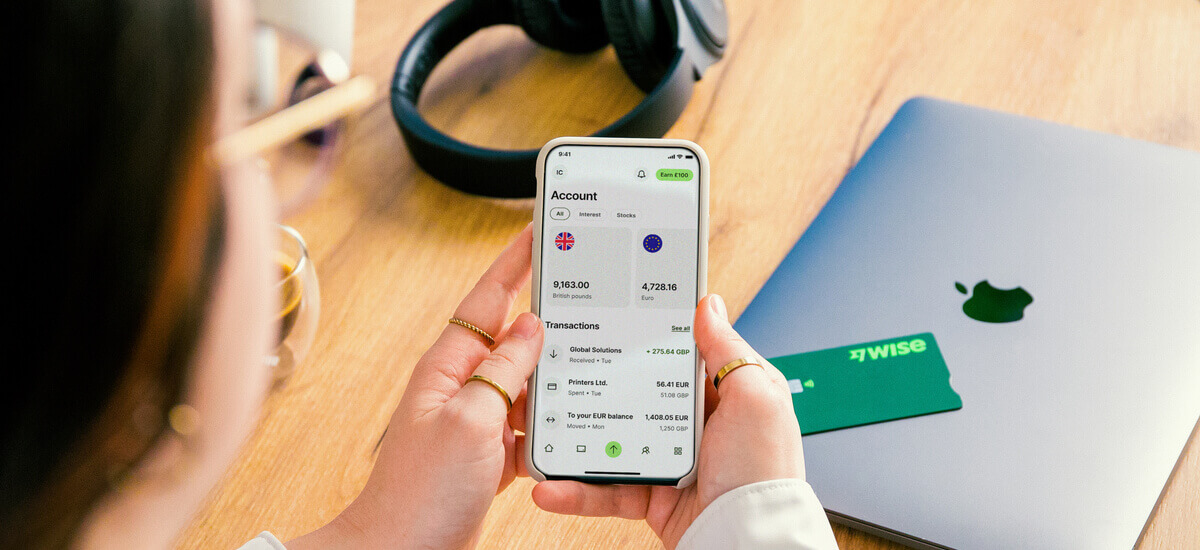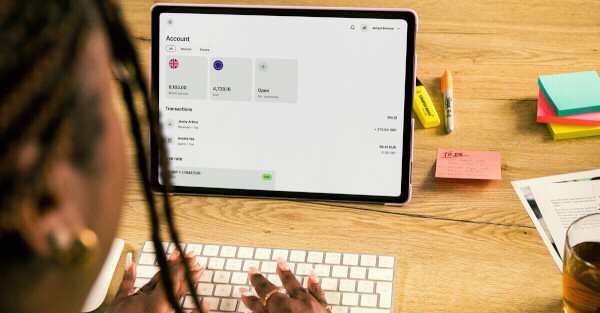10 Best Business Bank Accounts for Startups
Read our essential guide to the best business bank accounts for startups in the UK, comparing all of the most popular providers

If you’re still using a personal account for business it’s time to learn about the benefits of a business bank account, and why you need one. Using a business account vs a personal account can mean you get extra features, lower costs on common transactions, and easier ways to manage your business finances. It may even be mandatory to have a business account, depending on your UK entity type.
This guide explores the benefits of a business bank account. Plus, we’ll touch on Wise Business which is a non-bank business provider offering low cost international business accounts to manage currencies, spend with debit and expense cards, and send money to countries, with the mid-market rate and low fees from 0.33%.
💡 Learn more about Wise Business
A business account - which can come from a bank or an alternative licensed provider - offers ways for you to manage your business finances separately from your personal money.
As a rule of thumb you should have a business account as soon as you need to send and receive payments for your registered company. Business accounts tend to offer features required to manage your company smoothly, including invoicing and bookkeeping tools or integrations, ways to take customer bank and card payments, multi-currency features to send and receive foreign payments, and expense cards you can issue to employees.
We’ll cover the benefits of a business bank account in more detail, next.
Here’s a quick overview of some of the features you can get with a business account vs a personal account:
| Business account | Personal account |
|---|---|
| Manage your company finances | Manage your personal finances |
| Receive payments from customers, often including bank transfers and card payments | Receive personal payments such as your salary or a transfer from a friend |
| Send money to contractors, or suppliers, run payroll for employees | Send money to cover bills, rent and other common outgoings |
| Get a debit card and issue employee expense cards for easy spending and withdrawals | Get a debit card for easy spending and withdrawals |
| Access business credit and loans | Access personal credit and loans |
| Allow team members to view and manage your account - multiple users supported | Usually accounts can be held in only single or joint names |
| Extras: Accounting integrations, bulk payments, API use and other business friendly features | Extras: Some accounts offer additional perks like discounts with partner merchants or cashback on card spending |
If you have a UK registered business, you may find it’s mandatory to have a business bank account. This depends on the business type you have. Usually sole traders are not obligated to have a business account as their personal and business finances are viewed as the same from a legal perspective. If you have registered a limited company, however, you need a business account to effectively separate your personal and company finances.
Even if you are a sole trader and can use a personal account for your business finances, there are many good reasons to open a business account - let’s look at the benefits you may unlock.


It’s not difficult to open a business bank account in the UK as long as you have a registered business entity, and have the right paperwork and information to hand. Some banks allow you to apply for your business account online, but in some cases you’ll find you need to visit a branch with your documents, particularly if you don’t already hold a personal account with that specific bank.
As an alternative you may want to look at digital money providers like Wise Business, which has a fully online application, verification and onboarding process. You’ll simply need to enter your personal and business information on the website or in the app, and then upload clear images of the required documents for verification.
Get started with Wise Business 🚀
Whether you choose to open a business bank account or a business account with a non-bank service like Wise, you’ll need to provide some personal information about yourself as the business owner, as well as shareholders who own 25% or more of the business, and some key business roles such as directors. This information can include things like the individual’s full name, country of residence, and date of birth, supported with documents, which may be:
Aside from this you’ll need to provide some information about your business, which can include:
Many business accounts come with multi-access and permissions features, which allow you as the account owner to choose who else can view or manage your account.
This is helpful in a number of ways. If you’re offering your employees business expense cards, you can give them permission to view their own transactions and spending limits for example. Or if you employ an accountant, or have an internal finance team, you can make sure they have the access they need to do their jobs hassle free.
Different business accounts have their own features when it comes to multi-user access, which may be specifically aimed at the niche the provider focuses on. To give an example, let’s look at the multi-user access permission options in a Wise Business account:
Admin - overall account access including adding new users, managing limits, viewing and managing payments, statements and reports.
Payer - user can make and manage payments, including currency conversion or more complex requirements.
Preparer - user can view the account, download information and set up payments.
Viewer - user can view the account, including downloading reports and statements.
Employee - user can only see their own spending and spending limits.
Custom settings - make your own decisions about the exact feature access a user has.
Your money is kept safe in business accounts offered by banks and non-bank providers, using various methods. The way banks and non-bank providers operate may be a little different, but both have to comply with strict legislation to get licensed to operate in the UK.
All business account services will offer enhanced digital protections, which can include 2 factor authentication, account verification processes, and secure data management or encryption.
On top of that, your money may be protected by FSCS1 insurance if you use a bank, or safeguarded if you choose a non-bank provider. This is to protect you if the bank or provider fails.
With a bank you’ll usually find that funds held in a business account are protected in the event the bank fails, to a legal maximum set by the UK government2. Bear in mind that if you’re using a personal account for business, or if you’re a sole trader and manage your personal and business finances together, your FSCS insurance is capped at the legal maximum (85,000 GBP) for the aggregate value of the funds in both accounts. You can’t submit separate claims for your personal money and your business money.
If you choose a non-bank provider, usually your money is safeguarded - which means your funds are held in a bank (which may itself have FSCS insurance), and separate to the operating finances of the provider. This means that your money is kept safe in the event that your provider runs into financial difficulties.
If your business has excess cash, putting it into an interest earning business savings account can mean you get a better return on your funds. You’ll need to weigh up the pros and cons here. If you choose an easy access account you’ll be able to use your money more freely - but you may not get the very best interest rate out there. If you choose a fixed term savings product, you might get a better rate but you won’t necessarily have instant access to your business funds if you need them unexpectedly.
Learn more about the best business savings accounts in the UK here.
Many banks have basic business accounts which have no monthly fees. However, there are still usually transaction fees to pay which you’ll need to weigh up. For more complex account services, banks may charge a monthly fee, and may also offer ways to waive this fee if you maintain a certain balance, buy other products from the bank, or use a card regularly for example.
Non-bank providers can also be a good pick. You can find options which are free of monthly fees such as Wise Business, which also offer low transaction fees and great exchange rates if you trade internationally.
If you need to pay or get paid in foreign currencies, you could be better off with an alternative such as the Wise Business account.

With a Wise Business account, you can hold and exchange currencies all in one place. You can send payments to countries and get local account details to get paid in currencies like a local.
Whenever you need to send, spend or exchange foreign currencies, you’ll benefit from the mid-market exchange rate, with low, transparent fees.
When you open a Wise Business account, you’ll benefit from all of these useful features:
It’s quick and easy to open a Wise Business account, with a fully digital application, verification and on-boarding process. Check out the requirements here.
Get started with Wise Business 🚀
There are many benefits of a business bank account - and in some cases, having one is mandatory when you register a UK business. Using a personal account for business can be risky, and may mean you can’t access some key features to cut costs and save time when managing your company.
Sources used in this article:
Sources last checked December 19, 2024
*Please see terms of use and product availability for your region or visit Wise fees and pricing for the most up to date pricing and fee information.
This publication is provided for general information purposes and does not constitute legal, tax or other professional advice from Wise Payments Limited or its subsidiaries and its affiliates, and it is not intended as a substitute for obtaining advice from a financial advisor or any other professional.
We make no representations, warranties or guarantees, whether expressed or implied, that the content in the publication is accurate, complete or up to date.

Read our essential guide to the best business bank accounts for startups in the UK, comparing all of the most popular providers

Read our guide to the best online business bank accounts in the UK, including Tide, Starling, Revolut, ANNA and Wise Business.

Discover how to send money from Payoneer to Wise easily. Follow our step-by-step guide to transfer funds securely and save on international transactions.

Read our essential comparison of business bank account fees in the UK, including upfront, monthly and usage charges.

If you’re just starting out on an entrepreneurial journey you need smart ways to manage your money. This probably means you’re looking for the best bank...

Find the best business saving accounts to maximize profits and ensure financial security for your growing business needs.